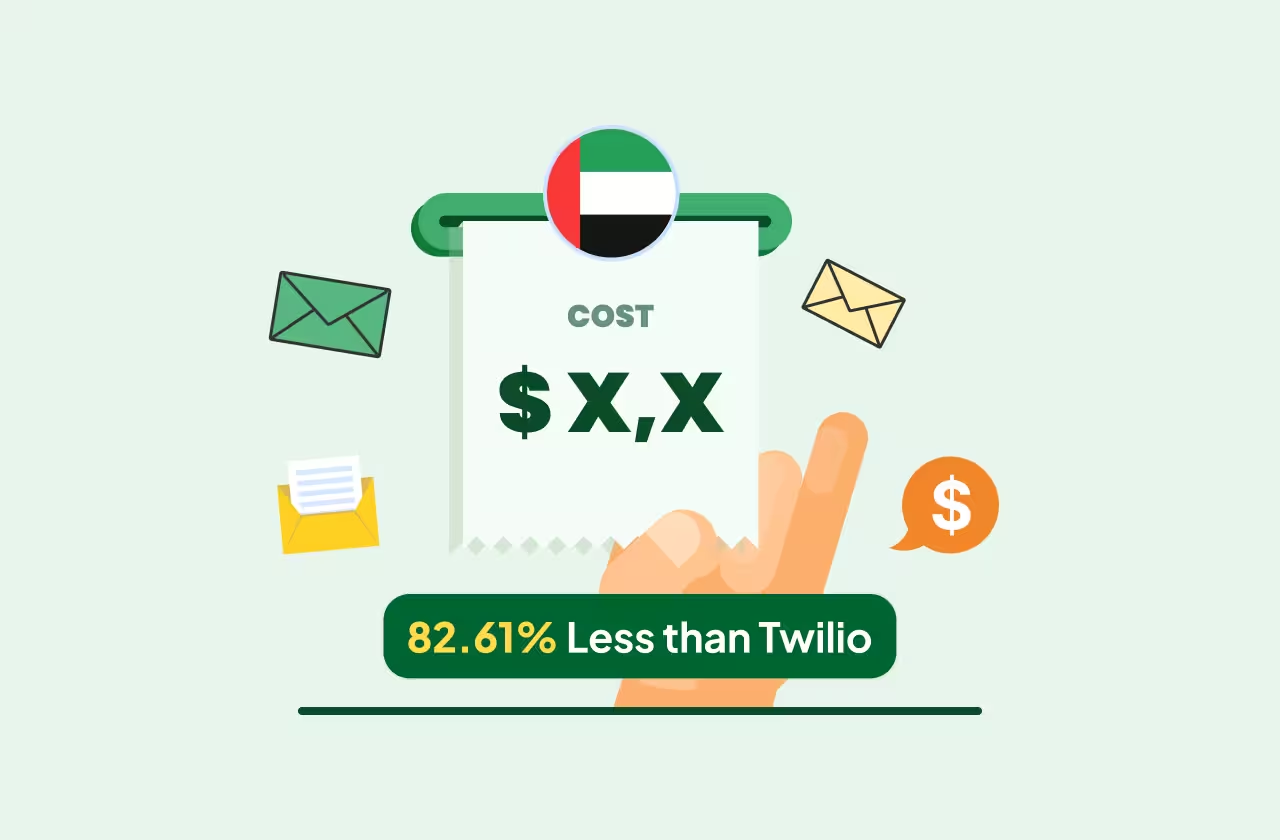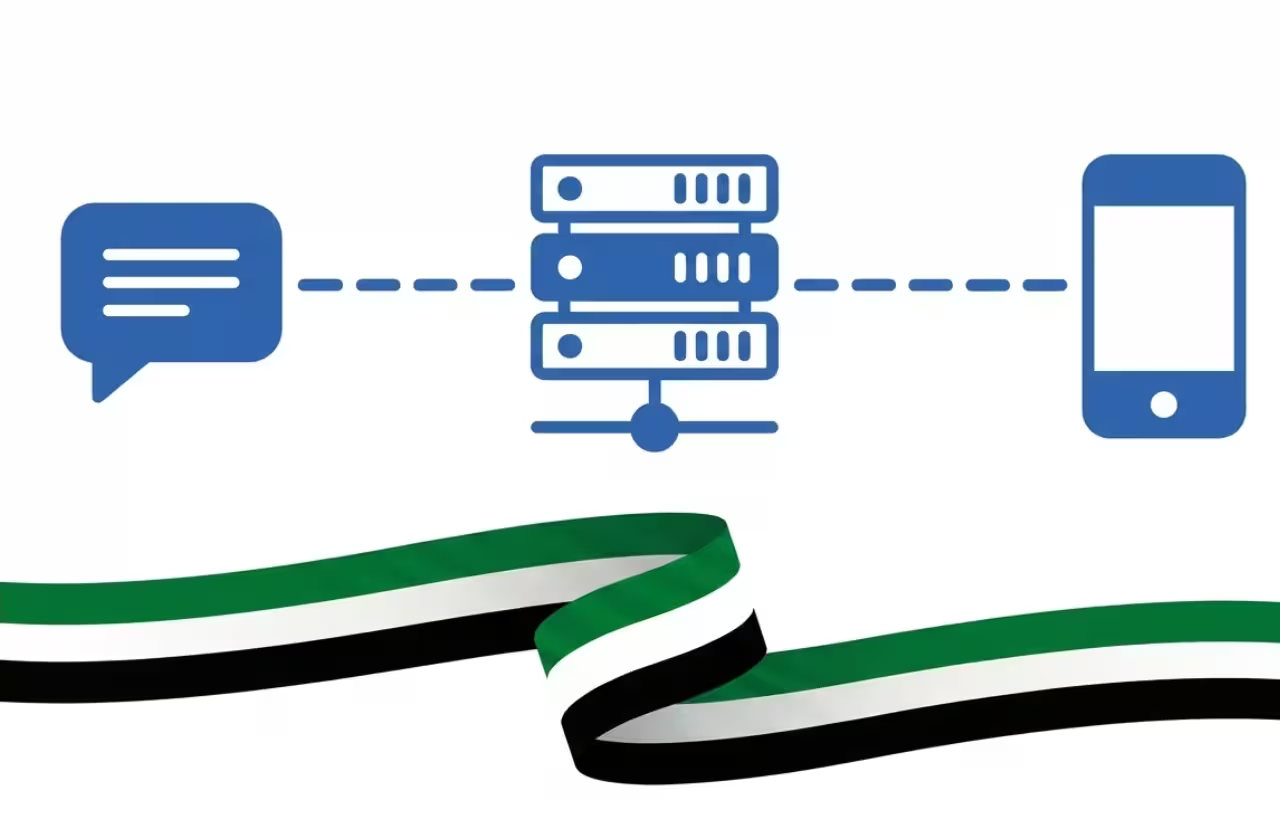Key Takeways
- SMS (A2P) industry will become a large one by 2027, clocking a revenue of about $77.76 billion
- SMS API, or SMS Application Programming Interface, is a tool that allows businesses to integrate SMS functionality into their applications
- Implementing SMS API leads to greater visibility, tracking, automation and improved efficiency
- A set of suggested steps should be followed to select the right SMS API provider
- Businesses leverage SMS APIs for a better customer experience in multiple ways like provide customer service, post contests etc.
With over 20 billion texts sent each day, it’s incredible to think that the first SMS message was only sent in 1992. Today, SMS still remains one of the most widely used data applications in the world. Communicating via text has become so popular, it’s become a new favorite medium for businesses to market products and services as well.
According to Global A2P SMS Report by Mobilesquared, by the end of 2020, the number of registered businesses using SMS had reached 20.1 million, an increase of around 24%, and accounting for 6.59% of total registered businesses.
The pandemic fueled A2P SMS growth, as businesses adapted to constraints during lockdowns and embraced social distancing post-lockdowns. Throughout this period, A2P SMS emerged as the singular channel connecting businesses with customers promptly. Governments also leveraged SMS for essential communications to reach almost an entire nation's population.

According to Statista, the revenues of A2P SMS messaging worldwide will increase from $42.84 billion in 2022 to $77.76 billion in 2027.

If your company's communication needs have outgrown traditional manual messaging systems, using an SMS API platform can be an ideal solution. In this comprehensive guide, we will break down all the important information you need to know about SMS API services and providers.
1. Understanding SMS API
1.1 What is SMS API?
SMS API, or SMS Application Programming Interface, is a tool that allows businesses to integrate SMS functionality into their applications. It facilitates the flow of information between programs and enables companies to provide customer notifications 24/7. By using an SMS API service, your company can enjoy a host of benefits, including greater visibility and tracking, high-end features and flexibility, and automation for improved efficiency.
1.2 How does SMS API work?
SMS API works by providing direct access to the components of an SMS gateway service. This means that you can seamlessly incorporate the features of the SMS gateway provider into your own system. For example, by using a bulk SMS API, you can send and receive bulk SMS messages through a dynamic range of applications. SMS API services offer innovative features and functionalities that enhance your communication strategy.
1.3 Pros and cons of using SMS API
Using an SMS API service comes with several advantages. Firstly, it provides greater visibility and tracking, allowing you to maintain an audit trail of message delivery and escalate in case of non-delivery. Secondly, it offers high-end features and flexibility, enabling you to incorporate SMS gateway features into your own system. Lastly, automation through SMS API improves efficiency by reducing the need for manual management. However, it's important to consider the limitations and potential challenges of using SMS API, such as compliance with rules and regulations, and the need for proper integration and development.
2. Choosing the Right SMS API Provider
2.1 Table Stakes
When selecting an SMS API provider, there are certain table stakes you should consider. These include the provider's reputation, reliability, customer support, and pricing structure. It's important to choose a provider that has a proven track record of delivering high-quality services and has a reliable infrastructure to support your SMS communication needs.
2.2 Geographic Reach
Another crucial factor to consider is the geographic reach of the SMS API provider. You want to ensure that the provider can deliver messages to your target audience in the regions where your business operates. Look for providers that have a wide coverage area and strong partnerships with local carriers.
2.3 Carrier Network Quality
The quality of the carrier network used by the SMS API provider is vital. A reliable and robust network ensures that your messages are delivered promptly and without any disruptions. Verify the provider's network quality and check if they have redundant connections to minimize the risk of message delivery failures.
2.4 Network Infrastructure
The network infrastructure of the SMS API provider plays a crucial role in ensuring the reliability and scalability of their services. Evaluate the provider's infrastructure, including their data centers, servers, and backup systems. A well-built infrastructure guarantees a high level of uptime and performance.
2.5 Security and Compliance
Security is of utmost importance when it comes to SMS communication. Ensure that the SMS API provider has robust security measures in place to protect your data and the privacy of your customers. They should comply with industry regulations and standards, such as GDPR, to ensure the secure handling of personal information.
2.6 Development Tools
Evaluate the development tools provided by the SMS API provider. Look for features like comprehensive documentation, SDKs, and sample code that make it easier for developers to integrate the API into your existing systems. A user-friendly API with well-documented resources can significantly streamline the development process.
2.7 Advanced Features
Consider the advanced features offered by the SMS API provider. These may include features like two-factor authentication, message tagging, scheduled messaging, and delivery reporting. Assess your business needs and choose a provider that offers the features that align with your communication requirements.
2.8 Pricing
Finally, compare the pricing of SMS API providers. Look for transparent pricing plans that suit your budget and offer good value for money. Consider the cost per message, any additional fees, and the scalability options available.
3. The Benefits of SMS API
3.1 Greater Visibility and Tracking
One of the key benefits of using an SMS API service is the ability to track messages with delivery recipients. This provides visibility into the exact time each message was delivered to the customer, allowing you to maintain an audit trail and escalate in case of non-delivery. Some SMS API services even support message tagging, which helps in transactional messaging applications.
3.2 High-End Features and Flexibility
SMS API services offer high-end features and flexibility to enhance your communication strategy. By directly accessing the components of the SMS gateway service, you can seamlessly incorporate the features into your own system. For example, using a bulk SMS gateway provider, you can send and receive bulk SMS messages through a range of applications. This flexibility allows businesses to tailor their messaging approach to meet their specific needs.
3.3 Automation for Improved Efficiency
SMS APIs allow for the automation of processes related to sending and receiving SMS messages. This automation can make workflows faster and more productive, reducing the need for manual management by staff. Time-sensitive messages can be scheduled through the API platform, ensuring that customers receive status updates, appointment reminders, or alerts at the right time. For banks and finance-based companies, SMS APIs enable secure sending of one-time passwords (OTPs) for enhanced security.
4. Customer Speak: Leveraging SMS API for Business Success
SMS API services have become indispensable for businesses across various industries. Let's explore how businesses can leverage SMS API to win in the market.
4.1 Run Sales and Deals
Timing plays a crucial role in sales and marketing. Unlike broadcast media, text messaging allows precise timing of messages. For example, if you sell pizza, sending promotional SMS in the evenings when people are starting to feel hungry can significantly increase sales. SMS API services enable businesses to reach out to customers at the right time, maximizing the chances of making a purchase.
4.2 Post Contests
Giveaways, sweepstakes, and other contests can be a great way to engage customers and drive sales. SMS API services allow businesses to send contest details directly to customers' phones, increasing the likelihood of participation. SMS messages have a higher chance of being read compared to emails, which often end up in the spam folder.
4.3 Improve Customer Service
SMS has become a preferred customer support platform for many customers. Businesses can leverage SMS API services to provide quick and efficient resolution of customer problems. Whether it's order updates, product information, or support queries, SMS offers a personal and convenient channel for customer communication.
4.4 Send Reminders
Automated appointment reminders through SMS have become a standard practice for healthcare organizations. SMS API services make it easy to schedule and send reminders to ensure that patients show up on time for their appointments. This saves time for both the healthcare provider and the patient, reducing no-shows and improving overall efficiency.
SMS API by Message Now
Message Now is the SMS API provider by Message Central. The platform facilitates SMS at scale with easy to set up SMS APIs. Here’s why you should select Message Now for your SMS needs and get in touch with the team :-
- Cost effective solution
- Lightning-fast SMS
- Easy broadcast
- Real time analytics
- SMS templates and scheduling










.avif)